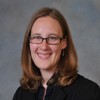
Formal verification and theorem proving have been used successfully in many discrete applications, such as chip design and verification. However, computation is not confined to the discrete world of desktop computing. Increasingly, we depend on discrete software to control safety-critical components of continuous physical systems (for example, adaptive cruise control in cars and collision avoidance in aircraft). It is vital that these hybrid (discrete and continuous) systems behave as designed, or they will cause more damage than they intend to fix. In this talk, I will present several challenges associated with verifying hybrid systems and how we can use differential dynamic logic and its proof calculus to ensure safety for hybrid systems under a continuously infinite range of circumstances.
In addition to covering some theoretical foundations for deductive verification of hybrid systems, I will discuss some of the practical uses of our verification tools: KeYmaera and KeYmaeraD. These tools have been used to verify a class of distributed collision avoidance controllers designed to work in environments with arbitrarily many aircraft. We prove that the controllers never allow the aircraft to get too close to one another, even when new planes approach an in-progress avoidance maneuver that the new plane may not be aware of. Because these safety guarantees always hold, the aircraft are protected against unexpected emergent behavior, which simulation and testing may miss.
Sarah Loos is a Ph.D. student in the computer science department at Carnegie Mellon University. Her research interests include logical analysis and formal verification of distributed hybrid systems, such as distributed car control and collision avoidance protocols for aircraft. She is a Department of Energy computational science graduate fellow and an NSF graduate research fellow. In addition to her role as co-editor of the ACM-W newsletter, Sarah has served as a student member on the board of trustees for the Anita Borg Institute for Women and Technology. She also serves on the board of directors for the Foundation for Learning Equality, a non-profit tech company dedicated to bringing the online learning revolution to communities with little or no internet connectivity. Sarah received her undergraduate degree from Indiana University with two BS degrees, in computer science and mathematics.
